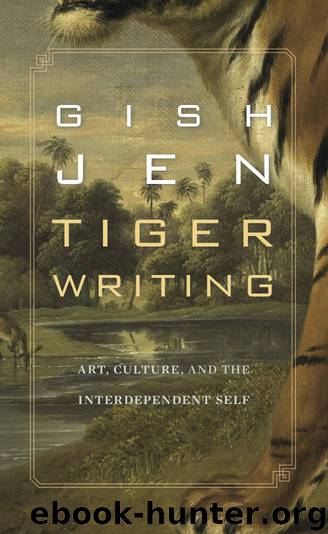Tiger Writing: Art, Culture, and the Interdependent Self by Jen Gish

Author:Jen, Gish [Jen, Gish]
Language: eng
Format: epub
ISBN: 9780989144209
Published: 2013-03-21T00:00:00+00:00
In his essay “Why I Write,” George Orwell confidently gave “four great motives for writing” that he feels exist in every writer. The first of these is sheer egotism—to “be talked about, to be remembered after death . . . , etc.” The second is aesthetic enthusiasm—an investment “in the impact of one sound on another, in the firmness of good prose or the rhythm of a good story.” Then there is historical impulse—the “desire to see things as they are, to find out true facts and store them up for the use of posterity.” And, finally, political purpose—a “desire to push the world in a certain direction”—which he finds in every person.
It strikes me today that I must add one more motive to the list, namely fascination with Western narrative. Some of you may know that I participated in an event last year with Joanne Chang, the wizard behind the Flour bakeries in Boston. During this evening she talked about growing up the daughter of Chinese immigrants in Dallas, and how fascinated she was when she went to her friends' houses and discovered that they had this extra course called “dessert.” That fascination gave rise to the cookies and pastries we all enjoy today.
Well, Western narrative was for me what dessert was for her. It was America—off limits, alluring, self-indulgent, expansive, brash, antiauthority, obsessed with happiness, and weirdly preoccupied—as Qi Wang might have predicted—with remembering things. And, naturally, it was everywhere—particularly in the predominantly Jewish suburb of Scarsdale, New York, to which my family moved when I was in fifth grade. I'll never forget the playground discourse—so funny, so gory, so exactingly blow-by-blow. And whereas the library at my old school, St. Eugene's in Yonkers, New York, had been a donation library—a windowless one-room affair with dark, sagging shelves and listing, soft-edged discards—the library in Greenacres Elementary School had glass, and air, and lovely, stout shelves packed with new, vertical books, every single one of which I read that first year after our move, including Albert Camus's The Stranger—the cover of which I can still recall, with that thick-spoked Algerian sun. (What, I remember wondering, are “inexecrable cries of hate?”) Today, of course, I support efforts to ensure that young readers will see their experiences reflected on the page; but for what it's worth, I myself was not reading back then to “find myself.” Rather, I was mostly focused, like an old Singaporean man, on my context. Books were for me an Outsiders' Guide to the Universe, which I read furtively and ecstatically but alphabetically—throwing Camus' Meursault into a kind of mental gumbo with Charles Wallace Murray and Jane Eyre; Miss Havisham was put in to stew with Sherlock Holmes and Lassie. The librarian must have spoken to me many times, but I don't much remember her; I only remember marching out with the books, an armful at time, as if under a spell.
It's an obsession I think about these days, when people talk about Asian and Asian American
Download
This site does not store any files on its server. We only index and link to content provided by other sites. Please contact the content providers to delete copyright contents if any and email us, we'll remove relevant links or contents immediately.
| African | Asian |
| Australian & Oceanian | Canadian |
| Caribbean & Latin American | European |
| Jewish | Middle Eastern |
| Russian | United States |
4 3 2 1: A Novel by Paul Auster(12392)
The handmaid's tale by Margaret Atwood(7764)
Giovanni's Room by James Baldwin(7346)
Asking the Right Questions: A Guide to Critical Thinking by M. Neil Browne & Stuart M. Keeley(5775)
Big Magic: Creative Living Beyond Fear by Elizabeth Gilbert(5771)
Ego Is the Enemy by Ryan Holiday(5450)
The Body: A Guide for Occupants by Bill Bryson(5097)
On Writing A Memoir of the Craft by Stephen King(4944)
Ken Follett - World without end by Ken Follett(4732)
Adulting by Kelly Williams Brown(4574)
Bluets by Maggie Nelson(4556)
Eat That Frog! by Brian Tracy(4540)
Guilty Pleasures by Laurell K Hamilton(4449)
The Poetry of Pablo Neruda by Pablo Neruda(4109)
Alive: The Story of the Andes Survivors by Piers Paul Read(4033)
White Noise - A Novel by Don DeLillo(4010)
Fingerprints of the Gods by Graham Hancock(4004)
The Book of Joy by Dalai Lama(3986)
The Bookshop by Penelope Fitzgerald(3853)
